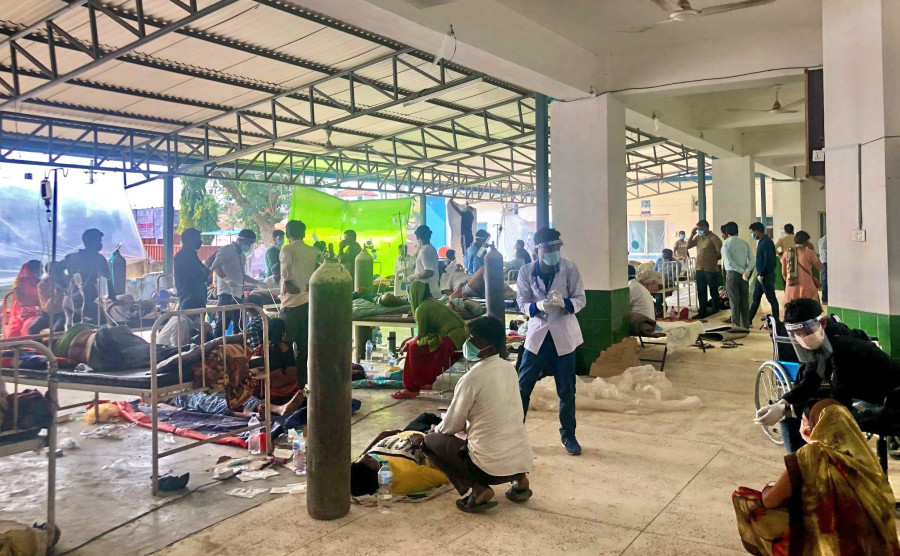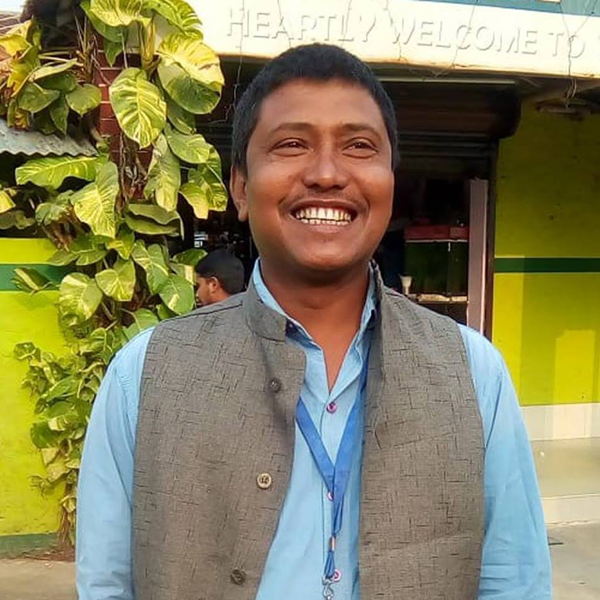Lumbini Province
Absence of contact tracing spells trouble for Lumbini
Authorities blame lack of resources and high infection rate for their slow response.
Sanju Paudel & Thakur Singh Tharu
A 31-year-old woman from Tilottama Municipality-6 in Rupandehi district suffered from fever and cold on May 9. Her polymerase chain reaction (PCR) test confirmed Covid-19 infection and she was isolated at home.
Her family members, however, did not feel the need to get tested since none of them had been showing symptoms of Covid-19. They continued to move around the marketplaces and mingled with people in the neighbourhood.
A few days later, some of them started showing symptoms of Covid-19. When they got tested, their results came back positive.
Around a dozen people from five houses in the community have tested positive for Covid-19 in the last two weeks.
A man from Butwal-11 tested positive for Covid-19 on May 6. The 28-year-old government employee says he caught the virus at his workplace. “I immediately informed the local unit. I also requested the sub-metropolis to conduct a PCR test of those who had come in my contact,” he said.
“The health workers came to my house to collect my swab sample only after four days and the PCR report came after 14 days. Fortunately, all my family members tested negative. We were all under a lot of stress while waiting for the test results,” he added.
The health authorities are not actively contact tracing in communities across several districts of Lumbini Province, say local people.
Symptomatic patients go to hospitals and health centres to get tested but those exhibiting no symptoms do not take the initiative to get tested. The lack of testing and contact tracing has led to the rapid spread of the virus in communities, local people say.
The local units and the health offices are not actively working to collect swabs for contact tracing. As a result, the number of people carrying out PCR tests has decreased.
Meanwhile, Dr Rajendra Giri, chief at the District Health Office in Rupandehi, says the infection rate in the district has been on a gradual decline. But he also admits that his office has yet to account for cases that haven’t been reported in the absence of contact tracing and testing.
“The authorities haven’t been able to carry out mass testing on a larger scale as compared to last year. We have asked the local units to prioritise tracing and testing but they have cited a lack of resources,” he said.
Keshav Bhattarai, the corona focal person of Tilottama Municipality in Rupandehi, said that the municipal office offers antigen tests to only the family of Covid-19 patients who succumb to the disease, and to those in emergency situations.
“The health ministry has asked those who come in contact with a Covid-19-infected person to stay in home isolation,” he said. “It is impossible to trace suspects when the infection rate is so high.”
The spread of Covid-19 in Banke too has gone unchecked even though the district administration has imposed prohibitory orders for the past month. Doctors call for an effective contact tracing of Covid-19 suspects if the curve is to be flattened in the district.
“The current data shows erratic highs and lows in the number of infections reported per day. The authorities must initiate mass testing because the current approach to testing leaves out a chunk of the population who can’t afford to undergo tests,” Dr Rajan Pandey, a consultant physician at Bheri Hospital, told the Post.
“Contact tracing must be expanded to control the disease from spreading further,” he said.
Naresh Shrestha, the public health officer at the District Health Office in Banke, said contact tracing in the district has come to a halt due to the high infection rate.
“The virus is spreading rapidly across settlements. It is impossible to trace and test people since the number of positive cases is overwhelming and we only have limited resources,” Shrestha said.
Eight local units in Banke are yet to initiate contact tracing at the community level for a lack of antigen and VTM kits, says Ram Bahadur Chand, chief at the Health Section of Nepalgunj Sub Metropolis.
“We plan to purchase kits and start conducting tests soon,” he said.
In Kapilvastu too, several local units are facing a shortage of necessary equipment to run tests in the communities.
“Only a few antigen tests have been performed in the district since we don’t have enough kits,” said Umesh Ghimire, the corona focal person at the District Health Office in Kapilvastu.
Lal Bahadur Darlami, ward chairman of Rainadevi Chhahara Ward No. 3 in Palpa, says his local unit has also stopped contact tracing and testing.
“Three weeks ago, we had collected the swab samples of some returnees from India. Since then, no testing has been done here,” he said.
Om Prakash Panthi, information officer at the District Health Office in Palpa, says the office distributed over 2,200 antigen kits and 450 VTM kits in various local units.
“But the local units have not conducted any tests. We have an additional 1,000 antigen and 1,500 VTM kits in the District Health Office,” said Panthi, adding that they have requested local units not to stop testing.
In Barbardiya Ward No. 9 of Bardiya district, almost every household has patients with common cold and coughs. No testing has been conducted in the area yet.
“We cannot conduct testing due to a lack of antigen and VTM kits amid a surge of Covid-19 cases,” said Deepa Gautam, vice chairperson of Badhiyatal Rural Municipality.
Sunil Chapagain, a local resident of Barbardiya, said that people with Covid-19 symptoms are seen roaming around in the market areas or meeting with people.
“Since there is no testing done here, one wouldn’t know if you are infected or not. This has led to the spread of the virus locally,” he said.
The situation is similar in Madhuban, Rajapur, Bansgadhi and Thakurbaba municipalities and Geruwa and Badhaiyatal rural municipalities of Bardiya.
“We could not expand testing due to a lack of antigen and VTM kits. This has increased the risk of Covid-19 spread in the communities,” said Ganesh KC, mayor of Madhuban Municipality.
With inputs from our correspondents in Lumbini Province




 21.02°C Kathmandu
21.02°C Kathmandu














